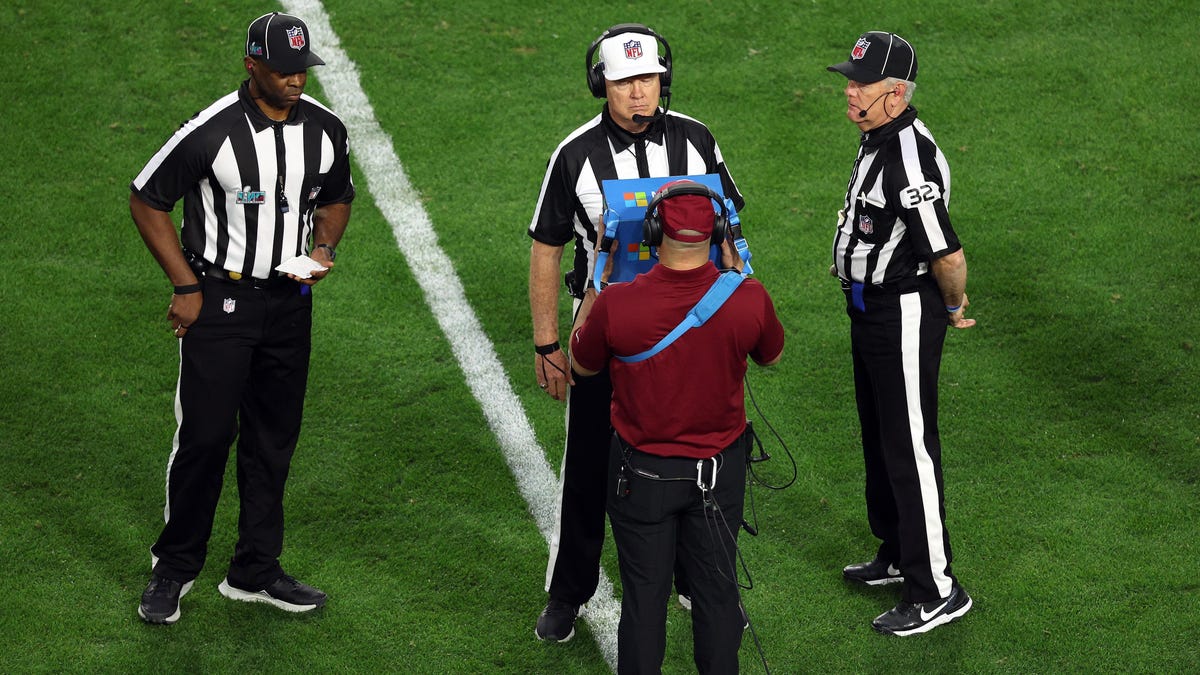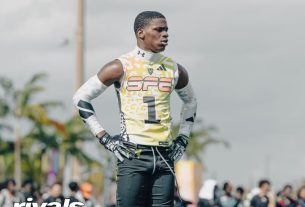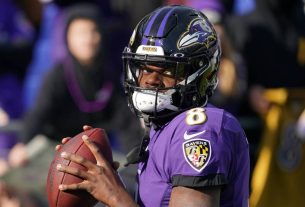Don’t ask me how many yards or touchdowns Jalen Hurts ran for or how many yards Patrick Mahomes threw for. The officiating crew for Super Bowl LVII put on one of the all-time great “I’m Him” collective performances in league history on Sunday night. Their profound impact on the game was felt for all four quarters and proved pivotal in deciding the world champion. What could have been a highwire thriller of an ending was grounded by an officiating crew that stole the scene with calls that felt like they were made by a finicky IRS accountant.
Need an example for why so many desperate fans latched onto Arian Foster’s (farcical) bit about being handed a script? This Super Bowl gave the masses plenty of fodder. Two weeks after a roughing the penalty call on Joseph Ossai handed the Chiefs their third AFC title in four years, James Bradberry’s holding call felt like something out of a Chiefs fan’s deus ex machina script edit where the officials swoop in for the rescue.
The refs were bad all night
The calls weren’t so much heavily skewed towards the Chiefs as they just sucked the air out of the room. Pedantic reviews of catches and yellow flags are dopamine killers. We would have been better off having Rihanna perform Pon de Replay on her glass stage between every stoppage in play by officials as a distraction because when the zebras take centerstage, we all lose.
Unlike Super Bowls past, which had memorable endings manifesting from human error or excellent feats of athleticism or play-calling moxy, Super Bowl LVII was the ChatGPT Bowl. Catches were decided formulaically instead of through common sense. Officials carried out the tedious job of weeding out spontaneity.
On 2nd-and-1, ball at the Kansas City 48 with a minute remaining in the first half, Jalen Hurts dropped back, lobbed a perfectly placed ball onto DeVonta Smith’s right shoulder. Smith, stumbled out of bounds while pinning the ball against his helmet with L’Jarius Sneed collapsing on top of him.
G/O Media may get a commission
Had that play stood, the Eagles would have been in position at the 13 to add a field goal onto their lead. Instead, the officials ruled that Smith’s catch wasn’t a catch by the strictest letter of the law possible. In any other sport, Smith’s catch is a memorable feat, but for some reason the officials calculated that negligible movement of the ball when he made contact with the grounds second later canceled out Smith’s spectacular haul.
The refs weren’t all bad to the Eagles though. After the half, they also ruled a clear catch and fumble by Miles Sanders as an incompletion, despite the beat he took before getting eviscerated and putting the ball on the grass. That call was also overturned and, instead of the Eagles surrendering seven points, they drove down and tacked seven onto their own score.
Later in the third quarter, a dime pass to Dallas Goedert on the sideline was ruled a catch despite him bobbling before he established position inbounds. Yet, the precedent dedicated earlier on the Smith and Sanders calls dictated that Goedert’s bobbled “catch” should have been an incompletion The officials were nothing, if not even-handed in their miscues. But, the lack of consistency on what was a catch remains confounding.
The James Bradberry holding call
However, nothing defined the night as much as the holding call on James Bradberry that handed the Super Bowl on a platter to Harrison Butker. Officials miss holding calls all the time. Chiefs left tackle Orlando Brown got away with a hold of Bengals pass rusher Trey Hendrickson on the final offensive play of the AFC Championship. They especially have a habit of letting holding calls that have a negligible effect on the play go.
Mahomes’ pass was so far into the endzone that JJ Smith-Schuster never had a chance. Head official Carl Cheffers explained after the game, “The receiver went to the inside and he was attempting to release to the outside. The defender grabbed the jersey with his right hand.”
However, that was a speeding ticket for traveling 75 in a 65 mph zone to decide the Super Bowl. Compared to Aaron Donald and Kooper Cupp’s career-defining plays in Super Bowl LVI or the Philly Special, this was a dud. The flag robbed the Eagles of a chance to partake in a game-winning drive and ended the drama in anticlimactic fashion. The endings to the AFC and NFC Championship Games exacerbated the lack of tension. The NFL’s Super Bowl production was perfectly choreographed from its multiple openings to the halftime show. Unfortunately, its most authoritative plays were decided by the wrong team.



